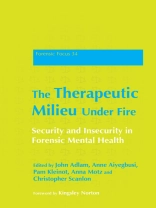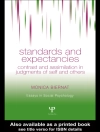This groundbreaking book explores the psychodynamics and socio-politics of the forensic therapeutic milieu, addressing some of the most difficult and complex issues facing practitioners. It sets out a psycho-social framework for understanding the predicament and the needs of those who live in and those who work in forensic mental health settings. It brings to life the thinking of those working on the frontline in an increasingly difficult and hostile environment, and draws together fresh and stimulating approaches to engagement with highly complex individuals who present challenges to traditional models of psychiatric assessment and treatment.
Contributors with considerable clinical experience and expertise from a range of disciplines consider the ethical, emotional and intellectual challenges of their work, and describe ways in which genuine containment and change can be achieved despite numerous perceived assaults on therapeutic relationships, and on the therapeutic milieu itself. Combining clinical case studies with organisational perspectives and clear descriptions of theoretical processes, they explore key issues including the challenges of maintaining role-appropriate, ‘boundaried’ relationships; the tensions between public protection and individual confidentiality; questions of risk and responsibility; duty of care and respect for individual liberty; the challenges posed by inter-professional tensions and rivalries; as well as specific clinical dilemmas. The difficulties they experience in fulfilling specific therapeutic roles in the face of uncertainties about the funding and commissioning of their services are addressed, and the final part of the book outlines some of the ways in which individuals, particular services and whole organisations may protect themselves when under attack.
This unique and highly original book is essential reading for all those working, or training to work, in both forensic and non-forensic inpatient therapeutic milieux and for academics and lay readers interested in the societal dynamics of inclusion and exclusion that are replicated and magnified in these settings.
Table of Content
Foreword by Kingsley Norton, Consultant Psychotherapist, WLMHT, UK. Editorial Commentary. Part I: The Interpersonal Minefield: The Psycho-Social Dynamics of Engagement. 1. Nursing at the Scene of the Crime. Rebecca Neeld, Group Psychotherapist, Cassel Hospital, West London Mental Health NHS Trust, UK and Tom Clarke, Associate Director of Nursing, South London and St George’s Mental Health NHS Foundation Trust and Honorary Lecturer, Kingston University, UK. 2. The Dynamics of Difference. Anne Aiyegbusi, Deputy Director of Nursing, Specialist and Forensic Services, West London Mental Health NHS Trust, UK. 3. Life on the Borders of Thought. Alan Corbett, Clinical Director of Immigrant Counselling and Psychotherapy (ICAP), UK. 4. Complaints as a Tool for Bullying. Celia Taylor, Vice-President, International Association for Forensic Psychotherapy. 5. Your Friends and Neighbours: Professional Boundary Violations – A Review of Perpetrator Typologies and Impact on Clients. Jonathan Coe, Managing Director, Clinic for Boundary Studies, UK. Part II: ‘Shot By Both Sides’: The Therapeutic Milieu Under Attack. 6. ‘Mirror Mirror’: Parallel Processes in Forensic Institutions. Gwen Adshead, Consultant Forensic Psychotherapist, Broadmoor Hospital, UK. 7. Single-Sex Units as a Defence Against Anxiety? Anna Motz, Consultant Clinical and Forensic Psychologist, Thames Valley Forensic Mental Health Services, UK. 8. Annihilating the Other: Forensic Aspects of Organisational Change. Martin Wrench, Associate Director of Social Work, Specialist Services Directorate, South West London and St George’s NHS Mental Health Trust, UK. 9. How to (Almost) Murder a Profession: The Unsolved Mystery of British Social Work. Andrew Cooper, Professor of Social Work, Tavistock Clinic and University of East London, UK. 10. Couples Who Kill: The Malignant Bonding. Estela Welldon, Founder and Honorary Elected President for Life, International Association for Forensic Psychotherapy. Part III: Courage Under Fire: Resilience, Reflection and Reparation. 11. Infanticide and Paedophilia as a Defence Against Incest: Work with a Man with a Severe Intellectual Disability. Valerie Sinason, President, Institute for Psychotherapy and Disability and Director, Clinic for Dissociative Studies, UK. 12. The Bereaved Families Forum: Finding the Other Within. Pam Kleinot, Psychoanalytic Psychotherapist and Group Analyst, City and Hackney Psychotherapy Department, UK. 13. What Makes a Secure Setting Secure? Stanley Ruszczynski, Consultant Adult Psychotherapist and Clinical Director, Portman Clinic, UK. 14. The Traumatised Organisation-in-the-Mind: Opening Up Space for Difficult Conversations in Difficult Places. Christopher Scanlon, Consultant Psychotherapist, SLAM, UK and John Adlam, Adult Psychotherapist, SWL&SG, UK. 15. Challenges to the Capacity to Think, Link and Hope. Earl Hopper, Psychoanalyst, Group Analyst and Organisational Consultant in private practice, London, UK. List of Contributors. References. Index.
About the author
Dr Anne Aiyegbusi is Deputy Director of Nursing, Specialist and Forensic Services within West London Mental Health NHS Trust. She has worked as a nurse in forensic mental health services for many years and is interested in integrating forensic psychotherapy with the nursing role. Additionally, she is interested in attachment theory and its application within forensic services.












